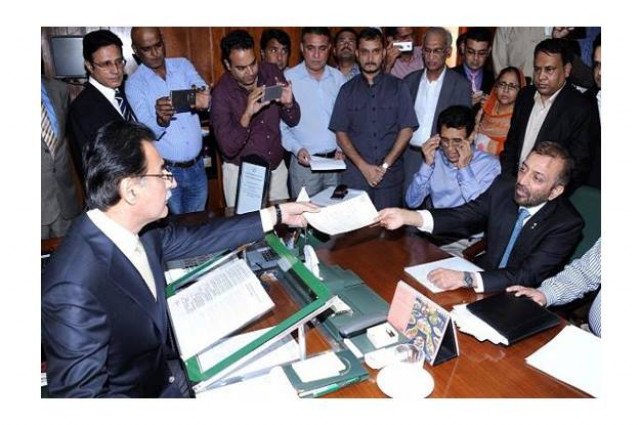Senate chairman refuses to accept MQM resignations
Rules lawmakers apparently quit in protest and not to relinquish office

PHOTO: PID
Senate Chairman Raza Rabbani has refused to accept the resignations of Muttahida Qaumi Movement (MQM) lawmakers, terming them politically motivated.
MQM legislators had resigned en masse from the Senate, National Assembly and the Sindh Assembly on August 12 to protest against alleged highhandedness of government agencies against the party, especially by the paramilitary Rangers, in the ongoing Karachi operation.
On Monday, Rabbani rejected the resignations, saying they were apparently submitted for ‘a political purpose’ and not to relinquish their memberships of the upper house of parliament.

“En masse resignations will be presumed, prima facie, in furtherance of a political purpose and not for the primary purpose of relinquishing the office of Senate membership,” he said while reading from the much-awaited ruling at the onset of the new session.
Several rounds of direct and indirect talks between the federal government and the MQM have failed to yield results. The deadlock continues as the government-appointed arbitrator, Jamiat Ulema-e-Islam-Fazl chief Maulana Fazlur Rehman, quit last month.
The MQM is adamant its elected representatives will not return to the assemblies unless the government meets its three key demands: 1) setting up of a monitoring committee to oversee the Rangers-led Karachi operation; 2) investigating ‘extrajudicial’ killings of MQM workers by a judicial commission; and 3) release of over 100 party workers allegedly in the custody of the law enforcement agencies.
Soon after the resignations issue came up, the National Assembly speaker was de-seated through the verdict of an election tribunal. He had reportedly written down his ruling.

In his ruling, Rabbani said the text of the MQM lawmakers’ resignations showed these were tendered in protest and not with the intention to quit. “It is the duty of the chairman or the speaker, as the case may be, to verify whether the resignation is voluntary, genuine and/or the member actually intends to relinquish, relieve or quit the seat and make it vacant,” he said.
“When such resignations are received en bloc from the members of a political party or combination of such parties, this verification becomes significantly more important,” he ruled.
The Senate chairman said he believed these en masse resignations were the result of conflict between the executive and the protesting party.
Under Article 64 of the Constitution, once the speaker or chairman accepts a resignation, he informs the election commission, which notifies the seat has fallen vacant. The election body then issues the schedule to fill such seats within 60 days.
“Therefore,” Rabbani explained, “it is a duty that the chairman or speaker, as the case may be, shall only accept resignation after the verification process has been completed.”
Some political analysts believe such practices where political parties submit resignations to press for their demands unnecessarily affect the parliament’s functioning.
Published in The Express Tribune, October 6th, 2015.



















COMMENTS
Comments are moderated and generally will be posted if they are on-topic and not abusive.
For more information, please see our Comments FAQ